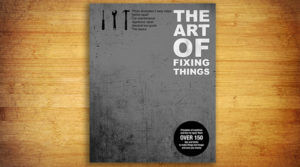On Paying Too Little: Why Saving Money Isn’t Always Better

I mentioned last week that I’d traveled to my hometown for my grandmother’s funeral, and to help begin the process of cleaning and organizing her home where she’d lived for the last fifty-two years. I found all sorts of interesting stuff (more to come soon), most of which was still as functional as when my grandparents bought it decades ago, with only a bit of dust or rust to show.
So, when I stumbled across this old booklet in a filing cabinet, I was particularly drawn to the quote on the back, which begins, “It’s unwise to pay too much…but it it’s worse to pay too little.” It’s attributed to the 18th century art critic and social thinker John Ruskin, though scholarship seems to suggest there’s little evidence to validate that origin. I’d never seen or read it before, but a little research suggests it’s known as “the common law of business balance.” And I found it, of all places, on the back of a small publication called Williams Blue Book of Gun Dealing 1965-66. I have no idea why my grandfather kept it (he’s wasn’t really a gun guy other than growing up on a farm and inheriting his own father’s), or why it survived the last forty-five plus years of cleaning sprees, but it’s full of cool 60s graphics and lots of timely Futura type, and quite fun to look over.
The quote reads,
It’s unwise to pay too much, but it’s worse to pay too little.
When you pay too much, you lose a little money – that’s all.
When you pay too little, you sometimes lose everything, because the thing you bought was incapable of doing the thing it was bought to do.
The common law of business balance prohibits paying a
little and getting a lot – it can’t be done.
If you deal with the lowest bidder, it is well to add something for the risk you run,
and if you do that you will have enough to pay for something better.
My grandfather and I didn’t have a lot in common, but piling through his stuff for a few days reminded me that he was committed to buying and investing in items made with integrity, tools and furniture that will last a lifetime, which is one of the founding principles of ManMade. I look forward to shining those pieces up and learning to use them.
He didn’t survive to know about my quitting a full-time career and starting ManMade, but maybe if he had, we’d finally have something to talk about.


![10 Things Every Man Should Own [Summer Edition]](https://www.manmadediy.com/wp-content/uploads/sites/52/2013/07/things-every-man-should-own-summer_large-81152-247x170.jpg)






